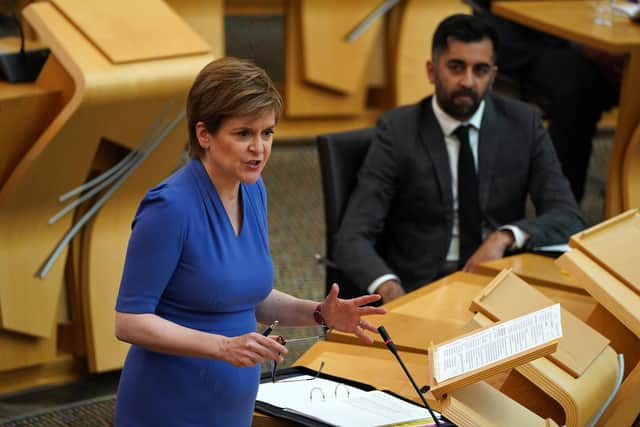Scotland Covid-19 situation 'fragile' amid 'optimistic' signs vaccinations reducing hospitalisations
However, in a Covid-19 update to the Scottish Parliament on Tuesday, the First Minister said early data was “optimistic” that vaccinations were reducing the number of hospitalisations.
She said this was a positive sign with regards to whether restrictions would continue to ease, announcing the Scottish Government would next update the public on June 21 of any planned relaxation of restrictions beyond June 28.
Advertisement
Hide AdAdvertisement
Hide Ad

Speaking in Holyrood, Ms Sturgeon said: “We continue to assess the data on this very closely – and, at this stage, we remain optimistic that vaccination will allow us to move progressively to a less restrictive way
of dealing with the virus.
“We have evidence that two doses of the vaccine does give protection against serious illness, even with the new Delta variant.
“As I indicated last week it appears that vaccination may be reducing the proportion of people who require hospital treatment as a result of Covid.”
The First Minister said there remained a need for “continued caution”, with case numbers continuing to rise and the possibility of an overwhelming burden on the NHS.
She said: “The number of people in hospital may not be rising as quickly as the number of new cases – but even so, it has roughly doubled in the last month. If cases continue to rise, we will see that trend continue.
“So in summary, our position is still fragile. Case numbers are higher than we would like.
"The virus is still causing serious health harms. And it still has the potential to put significant pressure on our health service.
“But on the upside – and it is a significant upside – the vaccines do appear to be doing their jobs, and that should give us all firm grounds for optimism.
Advertisement
Hide AdAdvertisement
Hide Ad"And it is why our top priority – and a key consideration in our future decisions – remains the speed at which we can vaccinate people, so that as many as possible get added protection against serious illness as quickly as possible.”
Ms Sturgeon came under pressure from Scottish Conservative leader Douglas Ross on whether there was in fact a real risk to the NHS.
Raising the lack of updates and conflicts in the rules around soft play areas, weddings and nursery graduations, Mr Ross criticised the lack of evidence for the First Minister’s claim there is a risk of overwhelming the NHS.
He said: “We have heard nothing from the First Minister or her government to back up that claim.
"We are at a difficult point in this pandemic when we need the public on side with the restrictions we continue to live with, yet we are not hearing from the government evidence to support very strong statements such as the significant burden of illness and death and severe pressure on the NHS.”
Anas Sarwar meanwhile called for all over-18s to have one dose of the vaccine by June 28 and for all over-40s to have two doses by the same date, along with a range of other measures designed to speed up vaccination.
The Scottish Labour leader said: “Our target was 400,000 vaccinations a week – I want us to hit that target and go beyond that target.
“Can we also, in those areas where there is a high turnover rate in terms of property and low attendance rates, ramp up the opening of walk-in vaccination centres so that people can access vaccinations without a letter, so that we can continue to go forwards, not backwards?”
Advertisement
Hide AdAdvertisement
Hide AdMs Sturgeon said the Scottish Government was vaccinating as quickly as supplies allowed, adding that was the single speed-limiting factor.
She said she “struggled to understand” Mr Ross’s point around a lack of evidence.
The First Minister said: “It is the case that, particularly while we have a significant portion of the population not fully vaccinated, rising cases could lead to a significant burden of illness, hospitalisation and death.
"The operative word there is could.
"If Douglas Ross wants to listen to the Prime Minister and the Prime Minister’s clinical advisers south of the border, I suspect he is more likely to listen to them than he is to listen to me.
"He will hear pretty much the same calculations and considerations underway as they have to make a decision next week about whether to go ahead with the next round of planned easing in England on June 22.”
A message from the Editor:
Thank you for reading this article. We're more reliant on your support than ever as the shift in consumer habits brought about by coronavirus impacts our advertisers.
If you haven't already, please consider supporting our trusted, fact-checked journalism by taking out a digital subscription.
Comments
Want to join the conversation? Please or to comment on this article.
